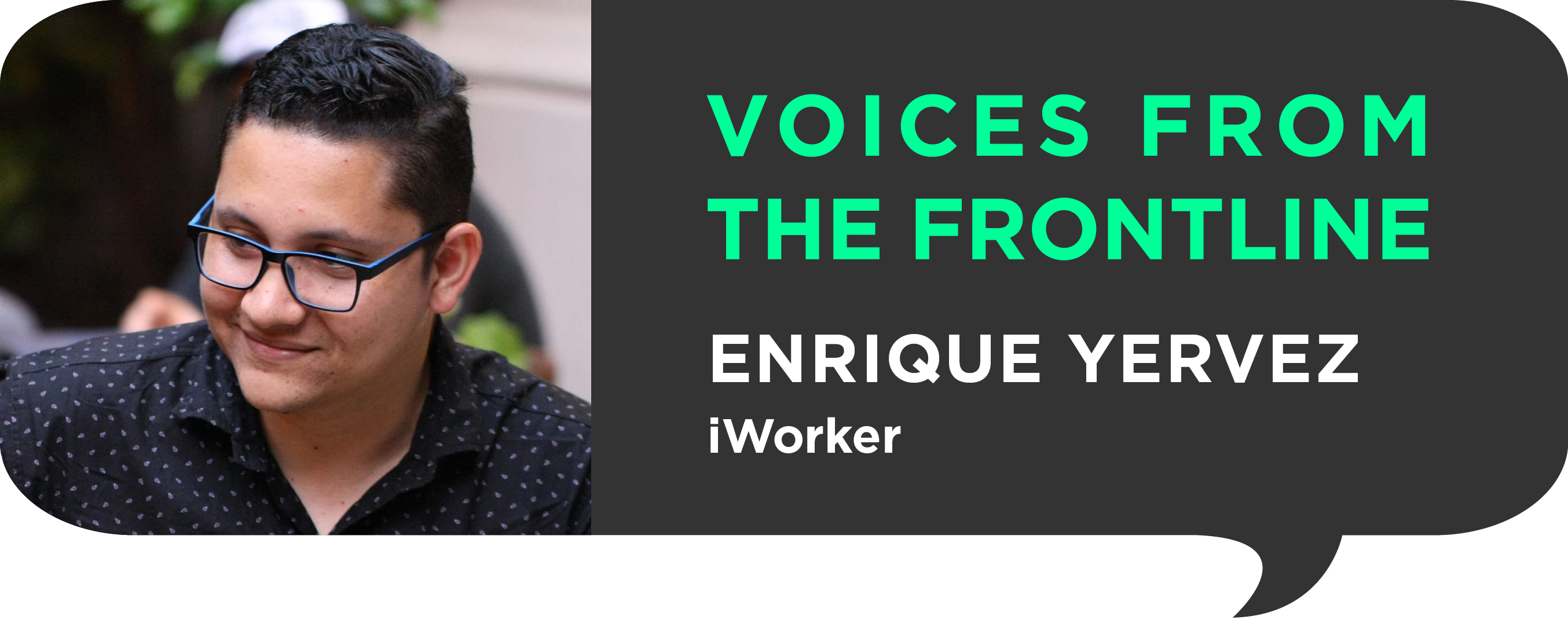'We are providing economic relief through remote working' – Enrique Yervez, iWorker
Social enterprise iWorker specialised in online working before it became the new normal. Co-founder Enrique Yervez tells us how the company has thrived during the pandemic, helping Latin Americans and Africans earn a fair wage working remotely for companies in the US, Europe and Canada. He reflects on fleeing the dire economic and political situation in Venezuela in 2018 and shares some tips for those new to working from home.

“I was born and raised in Caracas, Venezuela. I went to university there, and got my degree in public accounting and business administration. And I had a growing career in the hotel industry. But the economic situation of the country really started to deteriorate in around 2014. And then in 2016 hyperinflation hit us – it reached one million percent. I could feel the change – Venezuela went from being a good country to live in to one of the worst.
I started doing remote work on the side of my hotel job, like building WordPress websites for clients (I took digital marketing and web development courses in college). I was making way more remotely than I was making at the hotel in the whole year.
So I decided to quit and dedicate 100% of my time to working remotely. I believe that's one of the best decisions that I've taken so far.
Then in 2018, I left Venezuela with my pregnant wife to move to Argentina. I never wanted to leave the country, but with our daughter on the way we knew that we just could not raise her back home. Job opportunities were non-existent and I was working remotely, so I could move without any issues.
A Venezuelan crisis
In Argentina, I started working remotely for Jeb Koogler, one of the co-founders of iWorker. He hired me as a virtual assistant. Then a month later, I was managing his entire team. He had started the company with John Miles, but they didn't even have a name then. I joined in the very early stages – now, I'm one of the partners.
The Venezuelan crisis has made more than six million Venezuelans leave their country. Both Jeb and John were living in Latin America, so they knew a bunch of Venezuelans and decided to do something about it. iWorker recruits people in countries in crisis, trains and guides them in how to succeed working remotely, and in turn looks for and connects them to small businesses in the US, Europe and Canada who are looking to expand their business and where they could be a good fit.
My mom is a university professor, and she earns around $3 a month
Young Venezuelans are used to working and earning bolívars (Venezualan currency), but it loses value on a daily basis. The minimum wage in Venezuela right now is around $2 a month. My mom is a university professor, and she earns around $3 a month.
So iWorker pays workers in US dollars so that their salaries are protected against inflation. We charge clients between $5 and $12 an hour, which is enough to be competitive with other outsourcing companies, but high enough that our workers earn a strong living wage in their local economies.
We're providing economic relief to Venezuelans either still living there, or those who have left the country. The wages that we pay are competitive in the entire region, so people who are working with us from Venezuela can still move to Brazil, Colombia, Peru or other neighbouring countries. Today, we have provided work for over 300 Venezuelans and have helped our workers to earn over $800,000 in income.
A global crisis
During March and April 2020, we had a bunch of cancellations because of Covid-19 – business owners with physical businesses who had hired remote workers had to shut down. But then, four or so months later, when things started to get better for them, they came back. This is one of the most interesting things – the very first connections that we helped to build two or three years ago are still working. Once we make a good match between clients and workers, the situation goes pretty much into autopilot.
We have provided work for over 300 Venezuelans and helped our workers to earn over $800,000
At the same time, we also received tonnes of new requests to hire workers remotely. So we really had to ramp up our recruitment efforts. I have a background in finance and accounting so I'm usually in charge of payment and billing. But I also match workers with clients and do intro calls – we all do a bit of everything! We started recruiting 10 workers a week, going up to 20, to 50. There was also a quarantine in Venezuela and people could not go to the offices, so more people were looking for remote work opportunities. We received a lot of requests from professionals with strong educational backgrounds to join our team as workers, like accountants, even doctors and lawyers. We feel very lucky that the situation continued to get better for us.
Tips from the pros
We’ve developed guidance, strategies and advice to help our new workers adapt themselves to remote work, because it's something that they have never done. We try to walk them through systems and processes on how to make things work remotely to succeed with clients.
It’s also the first time that a lot of small business owners, entrepreneurs and companies have hired somebody to work remotely for them. So we give them tips on how to manage remote teams and how to keep communication on point.
Try to work from an environment that you only use for work, even if it’s the corner of your bedroom!
With everyone working from home, I think you need to cut distractions as much as you can. I'm working from home now, and I have a two-year-old daughter and my wife is not currently working. So it's easy to get distracted. I put my cell phone away, I put my headphones on and I do a daily checklist of things that I really want to get done. Try to work from an environment that you only use for work, even if it’s the corner of your bedroom! Those are the things that have been life-changing for me.
Limitless recruitment
We're still focused on Venezuela, and right now 83% of our workers are based there. But we're open to recruit people who need remote work – we also have people in Kenya, Zimbabwe, Nicaragua, Argentina. Peru, and Colombia.
I'm feeling very positive about the future. I try to expect the best but be prepared for the worst.”
Enrique was speaking to Sasha Gallick. Read more about iWorker.
Header image: a view of Maracay in northern Venezuela (credit: Jorge Salvador on Unsplash)
At Pioneers Post we're working hard to provide the most up-to-date news and resources to help social businesses and impact investors share their experiences, celebrate their achievements and get through the Covid-19 crisis. But we need your support to continue. As a social enterprise ourselves, Pioneers Post relies on paid subscriptions and partnerships to sustain our purpose-led journalism – so if you think it's worth having an independent, mission-driven, specialist media platform for the impact movement – in good times and in bad – please click here to subscribe.




